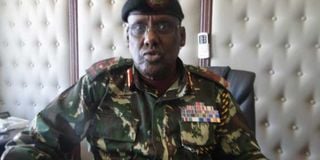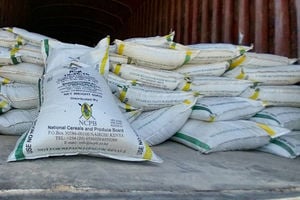Omar Abdi Shurie: Day Uhuru Kenyatta called me about mission to save village in Garissa

Senior Assistant Inspector-General of Police Omar Abdi Shurie speaks to the Nation in his office in Garissa on June 9, 2016.
What you need to know:
- I started to see decisive victory from its strategic points, thanks to our covert plan.
- The first phase of the battle saw a sharp rise in fatalities and injuries on their side.
Security incidents always seem to occur at odd and ungodly hours, I said to myself when the phone rang, sometime in May 2015, and Inspector-General of Police Joseph Boinet was on the line.
“Yumbis Centre has been taken over by al-Shabaab terrorists...last night. They have since hoisted their flag,” he said.
Yumbis is an active rural trade centre in Garissa County. It was his tone, rather than the words, which underlined the significance with which the invasion had to be taken in higher security circles.
It also gave an indication of the urgency required of the response. Previous attacks in the area had raised security vigilance significantly, and stirred concern at different levels of administration. There was a persistent view that terrorists were increasingly roaming freely in the countryside.
Their proclamation of a Caliphate in the area had helped to raise their image of a hydra-headed monstrous force. If not nipped in the bud, the monster would soon overrun the region. Al-Shabaab’s inch-by-inch method of conquest in Somalia exhausted counter terrorism forces. I had seen the authorities and counter-terrorism agencies run out of steam.
Subsequently, they had quit the now ungovernable places like the Coastline, western and eastern regions which al-Shabaab went on to control.
They had established their administration and imposed tax with fully armed gangs to enforce it on the residents in the now Islamic proto-State symbolised by their high flying flag.
This was the chill that the al-Rakat, al-Shabaab, al-Mujahideen with their perceived strength, due to al-Qaeda links, was sending down the spine of every Yumbis resident since their occupation the previous night.
I thought the tone of the Inspector-General could not underline more the urgency to restore public confidence in security agencies in Yumbis and its environs.
100 homesteads
Yumbis was a village some 70 kilometres from the Somalia border. It comprised about 100 homesteads, which were served by a mosque, a school and a few shops.
It was blessed with many animals such as camels, goats and cows, and was the source of milk to the neighbouring manyatta homesteads, as well as water from the only age-old borehole.
One of al-Shabaab terrorists hailed from this village, and its conquest would pay dividends in terms of the ripples of fear of al-Shabaab it would send through the communities.
It would herald forced recruitment of the people, beleaguered by a sense of heightened vulnerability in the face of the enemy within.
Deeply-rooted in quality intelligence
The task of responding to this invasion fell on me, given my previous experience in fighting terrorists. As the
Commandant of the Administration Police College in Embakasi, Nairobi,, it was known that I would have access to easy-to-mobilise resources including personnel without bureaucratic hiccups. Speed was of the essence.
However, as an insider, I realised we fell far below the threshold of undertaking such a gargantuan assignment in terms of resources and preparedness.
But now, it was in our hands. At any rate, I recalled many security operations that faced similar challenges, but had succeeded because they were deeply-rooted in quality intelligence, organisational strategies, preparation and leadership.
Sun Tzu in The Art of War came to my mind: “The best fighters win the war in their minds, and then go to the battle, while losers go to the battlefront first.”
I set about selecting a crack unit for the operation. I marshalled equipment, arms, rations and money we would need for the operation on an immediate basis.
Any additional requirements would have to await replenishments while in the field.
I briefed the team before we hit the Nairobi-Garissa road at 3.30am. As a field craft instructor, I reckon that going to war – no matter how small – gives no guarantee of returning home alive.
It requires nurturing and entertaining not only the hope of winning, but also the rationale of going to war. This comes from the imaginative analysis of the engagement, which must inspire the team to subordinate their lives to the greater national interest.
The faces and body language of the officers told me a lot. Nothing else is greater than leading inspired fighters. It was quite fulfilling to me watching and listening to the officers who ignored the rough and tumble of the road, even the notorious tactile vibrations on that Nairobi-Garissa road that rudely awakened those napping every so often.
They opened their eyes and looked around, each holding on to his gun, then chit-chatted and resumed napping. The silence underlay our collective anxiety revolving around the task ahead. The vehicles snaked through the largely flat terrain traversing Thika, Matuu, Kitui and Garissa in the night, remarkable by its absence of oncoming traffic. The night was just one long hour devoted more to individual self-administered psychological preparedness for the moment to come, than the collectively shared concern of what we may encounter in Yumbis.
We were in Garissa town by 9.30pm when the call from the Commander-in-Chief came through.
“Shurie,” came the easily distinguishable voice of President Uhuru Kenyatta on the other side.
“Yes, Sir,” I answered. “Where are you?” he asked, leaving no room for pleasantries. “I am in Garissa, Your Excellency Sir, heading to Yumbis.”
“That is very good, commander! You have done well,” he said before adding: “Okay, now proceed ... I want the enemy completely...totally repulsed”. We left Garissa through Desso 1 and Desso 11 in Fafi. At every stopover, crowds instantaneously milled around us.
Apparently, word had spread fast, raising a great deal of anxiety about the Yumbis “takeover”. They freely engaged us in discussions, and I could not help reading from their faces the morale our presence raised in them.
Dangerous place
They came willing to disclose whatever they knew. After confirming to us that al-Shabaab terrorists had occupied Yumbis, they implored us to drop any plans of venturing there. Yumbis was now a “dangerous” place, and al-Shabaab militia were many and strong, they said.
“That is where we are going,” I told them.
Some broke into tears. Some invoked the name of Allah, beseeching Him to protect us. Others stared blankly and some wished us well.
The news spread quickly and ahead of us that troops were headed to Yumbis. Children, women and men emerged from the hamlets and came over to see for themselves those daring to storm Yumbis. They broke into tears, then songs, then ululations and lastly cheers, as we resumed our journey.
“Allah! Be ahead of them ... be their commander now until victory,” prayed an elderly man.
Mothers and their children and elderly grandparents stood in line along the road and waved at us. Others bowed with the hands held together to show solidarity with us. They watched, and from a distance, I could still see them saying prayers, and waving at us as we left Desso 11.
“We need the prayers,” I said to myself.
On the outskirts of Yumbis, we left the vehicles behind, and approached the centre on foot. Our first action was to throw a cordon round it, and search the surrounding bushes to determine the level of infiltration, and avoid falling into the enemy’s trap. Suddenly, around5 pm, firing started all over the place. We took cover in the bush, and behind molehills or boulders.
I could not give a combat order without a good plan for counter-attack. I listened to the crack of the gun, and concluded it was the ordinary G3 rifle. It perplexed me. It could not have been from al-Shabaab. We thought it could be friendly forces also in pursuit of the enemy.
Disheartened combatants
The fire became intense, and I still withheld the order to respond. We instead crawled deeper into the bush, and took position to defend our ground.
The firing ceased, and they left. I ordered my personnel to search the area and later discovered they were our friendly forces also in pursuit of the enemy.
I could not have been happier with my patience to withholding the order to counter-attack, for this could have brought pain and regret.
Our team was efficient on the ground, and had comprehensive knowledge of the terrain. It helped us move with remarkable agility as we executed the frontal attack and neutralising al-Shabaab defence, inflicting considerable damage in the first few hours.
Simultaneously, a house-to-house search and combing of the bushes were underway, thanks to the support from residents. Soon, al-Shabaab terrorists were being flushed out of every nook and cranny in the entire Yumbis, now enveloped in a heavy cloud of gunfire.
I started to see decisive victory from its strategic points, thanks to our covert plan.
Al-Shabaab were literally confined to what had become their dying grounds, and now their remaining men were in desperation.
It was followed by another four hours of individual terrorists emerging from this hut or that bush and running helter-skelter, oftentimes shooting aimlessly and missing their targets.
The first phase of the battle saw a sharp rise in fatalities and injuries on their side.
Disheartened combatants
Our superior fire quickly pushed them into a siege, and the disheartened combatants were increasingly turning out to be a demoralised and disorganised lot.
It appeared that, many of their firearms were failing them. In what was clearly a losing battle, al-Shabaab were overwhelmed by confusion, with many retreating. Others resorted to hiding to try what they knew best, hit-and-run.
Hiding in the bush, ditches or in the few structures in the centre proved to be short-lived. We got the information and smoked them out. Al-Shabaab started fighting back with whatever missiles they laid their hands on, including stones.
When this too proved no match to our firepower, several of the last men standing surrendered.
We arrested two of their commanders. The remaining fighters, now without leadership, lost morale, and took to their heels under a hail of our bullets. It was a most disorderly moment of every person for himself.
They took to their heels with us in pursuit, raising their fatalities at every step. It weakened them and motivated my men. The terrorists had no rest, no ammunition, and nowhere to hide in the next six hours.
I blew the whistle to signal to the residents that all was clear. Villagers came out from their hiding places, waving at us, and in cheers. We assured them that security had been restored, and they returned to their houses for the night.
We hit the bush and pursued al-Shabaab 70 kilometres into the Somalia border. We combed every bush and searched every hamlet on the way, in an operation that took us the next one month.
The battle for Yumbis still reminds me every day of the strength of an army whose purpose to fight, becomes greater than their individual self-preservation.




